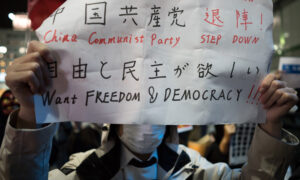COVID Protests Reveal Failure of the CCP to Indoctrinate Its Citizens: Rights Activist
The mass COVID-19 protests in China reveal the failure of the Chinese Communist Party (CCP) to indoctrinate its own people, according to British human rights activist Benedict Rogers.China’s white paper revolution evolved quickly with protestors opposing stringent lockdown measures and chanting, “Xi Jinping, Step down,” and “CCP, Step down.” The developments show that public discontent has turned into protests in the quest for democracy and freedom. “I think that’s hugely significant because it tells us that, contrary to what the CCP would like us to believe, the people of China have not actually been indoctrinated by the CCP,” Rogers told NTD’s “China in Focus” program on Dec 3. Benedict Richard Victor Rogers, a British human rights activist and co-founder and CEO of Hong Kong Watch group, said in an interview with the Epoch Times on Nov. 23, that Hong Kong’s press freedom has been devastated and utterly destroyed. (Liang Yao/The Epoch Times) The activist characterized the widespread demonstrations as “the most significant protests that we have seen in China since the Tiananmen Square massacre of 1989.” “We are seeing the boiling over of frustration and discontent that has been simmering for some time with the increasingly repressive nature of the regime, the surveillance state, but also the economic slowdown,” he said. According to Rogers, the CCP had an unspoken deal with the Chinese people during the economic growth in China between 1990 and 2000. “The CCP would have some degree of legitimacy in the eyes of the people in return for presiding over an economic boom that saw living standards raised significantly and that, in the 90s and early 2000s, allowed for a certain amount of limited space,” he said. “Xi Jinping has dismantled all of that. He seems to be hostile to private enterprise and entrepreneurialism and has undone some of the economic reforms of his predecessors,” Rogers said. As co-founder and chief executive of Hong Kong Watch, Rogers said he was denied entry to Hong Kong in 2017, even before Beijing’s draconian National Security Law was put into effect. As the author of “The China Nexus,” he was also threatened by the Hong Kong Police, under the National Security Law, with a prison sentence for being what they call “the threat to China’s national security.” The account, in his opinion, shows that the Communist regime” seems to be just incredibly scared of two things, the truth, but also any criticism.” “It appears that even someone as relatively insignificant as me, they regard with alarm. To me that says that actually, this is not a confident and secure regime. It’s a much more fragile and insecure regime than perhaps we sometimes realize,” Rogers opined. Impose Tough Sanctions The activist further mapped out how the West should help the Chinese protesters. He called for an effort to “circumvent the Great Firewall of China” in order to communicate support to the people of China.” “We should be messaging very clearly, that we stand with the Chinese people, the people who are protesting, and those who are not protesting, but who share the same goals,” he said. “And we should also be standing up to the CCP regime in Beijing, and signaling, most especially at this time, that if they were to embark on a really serious crackdown, there will be serious consequences,” he added. Rogers suggested in this case, tough, targeted sanctions be imposed not against China or the people of China but against the CCP. “We haven’t really used the sanctions tools that we have, whether that’s targeted Magnitsky sanctions for which many of our countries have legislation, or whether it’s other sanctions measures that could be taken,” the activist noted. “For too long, we’ve allowed the CCP to get away with impunity with it, with atrocities and crimes against humanity,” he said. “Those of us who have freedom, have a responsibility not to take it for granted, but actually to cherish it, to protect it, and to use our freedoms on behalf of those who are denied them,” Rogers said. Follow Tiffany Meier is a New York-based reporter and host of NTD's "China in Focus." Follow Hannah Ng is a reporter covering U.S. and China news. She holds a master's degree in international and development economics from the University of Applied Science Berlin.

The mass COVID-19 protests in China reveal the failure of the Chinese Communist Party (CCP) to indoctrinate its own people, according to British human rights activist Benedict Rogers.
China’s white paper revolution evolved quickly with protestors opposing stringent lockdown measures and chanting, “Xi Jinping, Step down,” and “CCP, Step down.” The developments show that public discontent has turned into protests in the quest for democracy and freedom.
“I think that’s hugely significant because it tells us that, contrary to what the CCP would like us to believe, the people of China have not actually been indoctrinated by the CCP,” Rogers told NTD’s “China in Focus” program on Dec 3.

The activist characterized the widespread demonstrations as “the most significant protests that we have seen in China since the Tiananmen Square massacre of 1989.”
“We are seeing the boiling over of frustration and discontent that has been simmering for some time with the increasingly repressive nature of the regime, the surveillance state, but also the economic slowdown,” he said.
According to Rogers, the CCP had an unspoken deal with the Chinese people during the economic growth in China between 1990 and 2000.
“The CCP would have some degree of legitimacy in the eyes of the people in return for presiding over an economic boom that saw living standards raised significantly and that, in the 90s and early 2000s, allowed for a certain amount of limited space,” he said.
“Xi Jinping has dismantled all of that. He seems to be hostile to private enterprise and entrepreneurialism and has undone some of the economic reforms of his predecessors,” Rogers said.
As co-founder and chief executive of Hong Kong Watch, Rogers said he was denied entry to Hong Kong in 2017, even before Beijing’s draconian National Security Law was put into effect.
As the author of “The China Nexus,” he was also threatened by the Hong Kong Police, under the National Security Law, with a prison sentence for being what they call “the threat to China’s national security.”
The account, in his opinion, shows that the Communist regime” seems to be just incredibly scared of two things, the truth, but also any criticism.”
“It appears that even someone as relatively insignificant as me, they regard with alarm. To me that says that actually, this is not a confident and secure regime. It’s a much more fragile and insecure regime than perhaps we sometimes realize,” Rogers opined.
Impose Tough Sanctions
The activist further mapped out how the West should help the Chinese protesters.
He called for an effort to “circumvent the Great Firewall of China” in order to communicate support to the people of China.”
“We should be messaging very clearly, that we stand with the Chinese people, the people who are protesting, and those who are not protesting, but who share the same goals,” he said.
“And we should also be standing up to the CCP regime in Beijing, and signaling, most especially at this time, that if they were to embark on a really serious crackdown, there will be serious consequences,” he added.
Rogers suggested in this case, tough, targeted sanctions be imposed not against China or the people of China but against the CCP.
“We haven’t really used the sanctions tools that we have, whether that’s targeted Magnitsky sanctions for which many of our countries have legislation, or whether it’s other sanctions measures that could be taken,” the activist noted.
“For too long, we’ve allowed the CCP to get away with impunity with it, with atrocities and crimes against humanity,” he said.
“Those of us who have freedom, have a responsibility not to take it for granted, but actually to cherish it, to protect it, and to use our freedoms on behalf of those who are denied them,” Rogers said.













